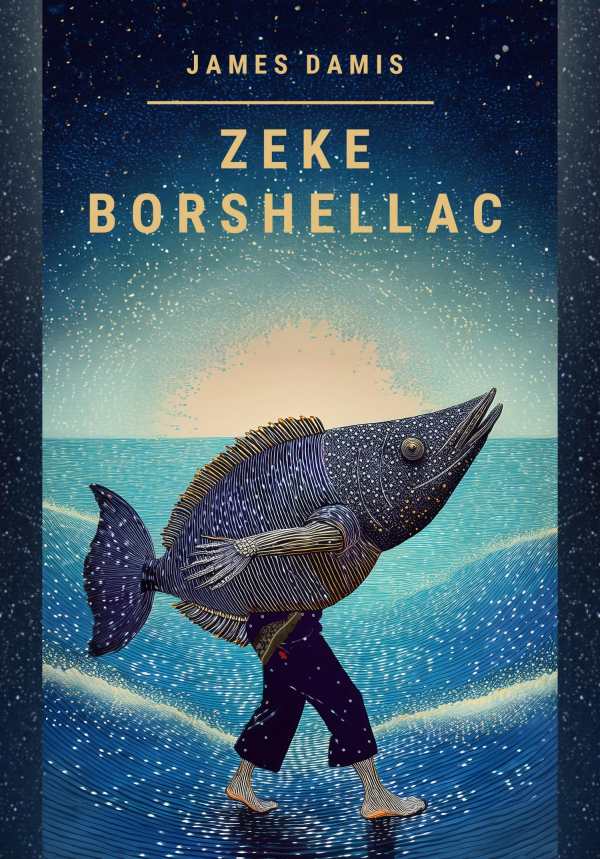Zeke Borshellac
Overflowing with tall tales and slapstick humor, Zeke Borshellac traces a hapless adventurer’s coming-of-age.
In James Damis’s madcap bildungsroman Zeke Borshellac, an idealistic young man has fantastical experiences as he seeks his place in the world.
In a premodern world rife with violent sailors and destitute beings, Zeke stumbles from one job to the next, eager to learn and find stability. He is foiled at every turn. Indeed, Zeke falls overboard en route to New Jersey for work as a scullion. Rescued from the sea by a fishing vessel, he’s tormented by the sailors over his propensity for projectile vomiting and is soon thrown overboard again, this time wearing a giant halibut’s hollowed-out head. That is the auspicious beginning of his epic travels. He experiences homeless encampments and demolition crews, he becomes the leader of a movement aiming to save small farms from big industry, and he brings the fractious homeless community and the farmers together into a political coalition.
The novel overflows with tall tales and slapstick humor. At one point, Zeke rides a bicycle into the ocean to escape a gangster known as the Moravian; the event is the inspiration for song lyrics later in the book. At another time, Zeke runs headfirst into trees in a dark forest until he encounters a radiant dairymaid and falls in love at first sight. Dozens of such zany stories and subplots appear in imaginative, adrenaline-driven scenes. Still, as these novel events stack up, the book becomes repetitive. Zeke is beaten up, manipulated, and tortured countless times; he spends weeks wearing the rotting fish head and responds with boredom, diminishing the stakes of his escapades.
The book’s heightened tone extends to its acrobatic, eye-grabbing prose, which revels in ornate terms including scuttlebutt, ululate, and cheroot:
Pirates always felt at home in Bluddenville amidst the ever lurking threat of violence on the streets, the bustling depth of its prostitution trade, the gambling joints and betting parlors, the bare-knuckle pier boxing, and the high-grade opium invariably available to the hopheads languishing around the harbor alleys.
People have rich, strange names, too: There’s a Dieter Schrampenkrieg, a Beppo Malzone, and a Spodio. The archaic quality of the language is thrilling if exaggerated. Even mundane actions like going for a walk or sitting around a table with others are described at length, sometimes obscuring moments of true significance. Paragraphs run pages long, and invented Americana songs abound to further aggrandize Zeke’s deeds and the novel’s milieu. In the end, such textures do make Zeke’s dizzying world compelling, if surreal.
Zeke Borshellac is an inspired novel about a goodhearted man’s zany adventures.
Reviewed by
Willem Marx
Disclosure: This article is not an endorsement, but a review. The publisher of this book provided free copies of the book and paid a small fee to have their book reviewed by a professional reviewer. Foreword Reviews and Clarion Reviews make no guarantee that the publisher will receive a positive review. Foreword Magazine, Inc. is disclosing this in accordance with the Federal Trade Commission’s 16 CFR, Part 255.

